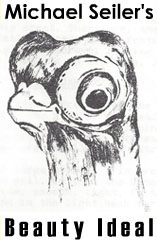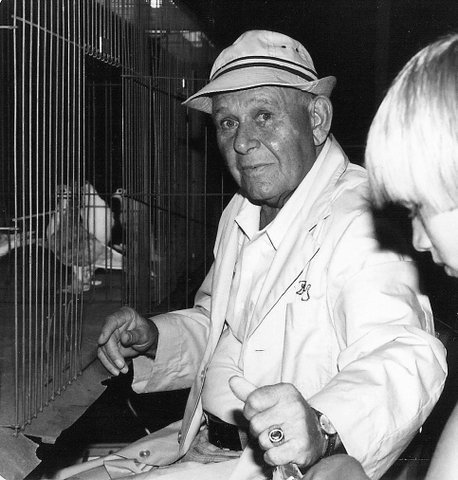 I was only 16 years old when I had the privilege of meeting Rudy Strnad. A Flying Tippler Breeder in my area knew Rudy from the local shows and feed stores and gave me his address. So one Saturday afternoon in 1968, I rode my bike to Rudy’s house and I found him in his back yard sitting in a beach chair, hand feeding some youngsters and so I introduced myself. We struck up an excellent friendship that lasted 15 years until he passed away at age 75.
I was only 16 years old when I had the privilege of meeting Rudy Strnad. A Flying Tippler Breeder in my area knew Rudy from the local shows and feed stores and gave me his address. So one Saturday afternoon in 1968, I rode my bike to Rudy’s house and I found him in his back yard sitting in a beach chair, hand feeding some youngsters and so I introduced myself. We struck up an excellent friendship that lasted 15 years until he passed away at age 75.
Rudy was fortunate to have retired at age 50 after he sold his brother his share of a successful drop forging business, so he had plenty of free time to raise and develop his Budapest. He specialized in the dark beak Budapest and he raised Storks, Blues and Grizzles from the time I met him. Prior to meeting Rudy, he had raised Vienna and Vienna Ganzles.
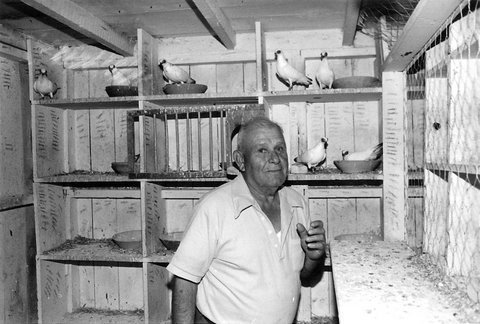
We traveled together all over the NY metropolitan area. We attended many shows during those years – Nassau-Suffolk, Garden State Variety, Empire, NPA Nationals (Atlantic City, Lancaster, Philadelphia-South Jersey) NY Combine, Reading, Philadelphia-South Jersey, York, Pa, and Faircount, Conn. We visited all the feed stores on Sunday mornings and Tuesday night’s were dedicated to visiting Sam’s Bird Store and Nursery on Boston-Post Road in the Bronx. Many Friday nights were spent between the Empire Club meetings, the Garden State Variety Club and the Bayshore Variety Club. We spent a tremendous amount of time together and traveled with many well-known breeders of the time. We shared many adventures and every trip was a learning experience for me. It was a true happening!
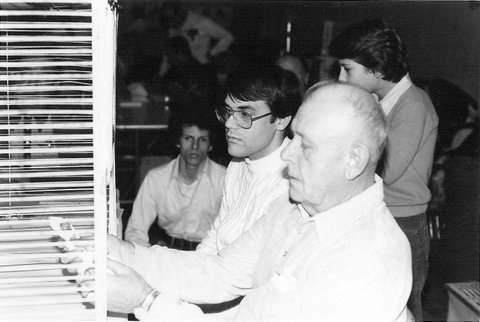
Rudy was a short face judge and, also, an all variety judge who was in great demand. I very readily became his chauffeur and wherever he wanted to go, we went. The height of the “Pigeon Game” in America was during this time frame. We still have many of the same shows, but the bird stores are gone except for the 2 in the Bronx and one in Long Island. The bird stores had so very many fanciers running around exchanging birds. Everyone was always looking for a bird for their program. The bird stores were a very good place to exchange and buy birds. These were the days before PMV-1. We usually ended up in a diner for breakfast or lunch which gave us all a very good opportunity to discuss breeding techniques, problems, medications and the like.
Rudy was president of the EMPIRE Short Face Tumbler Club and under his charge the club decided to modify, create, and improve the Standard Book of Perfection. Rudy, also, had the Empire Club Chartered in New York State. The breeds all greatly improved at that period of time. There were many breeders and excellent breeding stock available and we were able to work together to improve the structure and color of our respective breeds. We all leaned on Rudy for advice. He, also, knew so many breeders that he could steer you in the right direction to find the “missing piece” you were looking for. Who needed a cock? A hen? He brokered all the deals that everyone needed to make. He was the clearing house! He was home all day to take the phone calls and receive visitors. Kearny, NJ was the hotspot. Everyone knew Rudy and he was totally respected by all who knew him. He was a tremendous breeder and never wasted anytime with a bird unless he could use it in his program. Rudy never produced birds in large quantities. His usually flock was about 15 pair and if he had a good season he raised approximately 50 youngsters. Since he only specialized in the dark beak Budapest (Storks, Blues, and Grizzles) it was not necessary to keep more birds than that. He always released birds in early to late Fall, after that period of time, it was unlikely that you be able to get any spare birds. He always had a waiting list for his birds and they did go fast. Any Budapest breeder who raised dark beaked birds had his bloodline in their flocks. He did plenty of importing as well. Most of the birds that came into the country came from Dr. Istvan Szecsenyi of Hungary or from Henry Weiss, who was German, and living here in Hackensack, NJ. However, there were many Budapest here in the USA before WWII. The importations after the War just helped to improve excellent existing bloodlines.
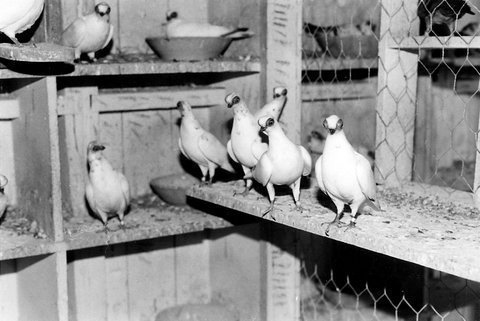
During the time that Rudy raised Storks, Blues and Grizzles, only the Storks and Blues were accepted into the Standard of Perfection. The beautiful steel marked grizzles were considered a “sport” or stock pigeon. In time, the Grizzles became far superior to the Storks and Blues. Rudy was instrumental in expanding the Budapest Standard to include the Grizzles. He and I wrote the standard for the Grizzles and after the standard was re-written, the membership voted to include the Grizzles permanently. This accomplishment was totally due to the respect that the breeders had for Rudy as a leader and a showman.
Regarding judging birds, Rudy always had a saying: “It is easier to pick a winner out of a group of quality birds, than it is to pick a winner out of a group of mediocre birds.” If you ever have the experience of judging yourself, then you will learn to appreciate what Rudy was telling us at the time. Picking a quality show bird just becomes a preference for a particular trait when making your decision. When the birds are so very far apart it is so very much harder to make your decision and it very hard to explain yourself to the exhibitors present.
I was able to meet Dr. Szecsenyi through Rudy and eventually I was able to visit Hungary even during Communist times. The Cold War was still on. When I arrived in Europe, so very many people asked about Rudy and were happy with his accomplishments. The only trait that Rudy never mastered with the Budapest was their body type. Rudy was a “head hunter” and the body and stance suffered. I would dare to say that this problem continued to be a problem in the breed until I brought back better bodied birds from Hungary and Emil Piergiorgi brought back nice bodied birds from Germany leading to the successful results that we have today in a complete Budapest. It is very hard to produce a quality Budapest in Head and Bearing in the same bird.
When Rudy passed, we really lost a true dedicated breeder and friend on so many levels. His contributions to the hobby will never be forgotten.
